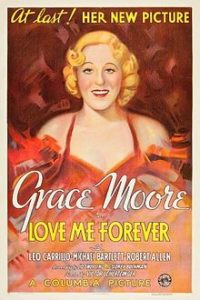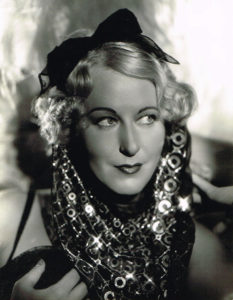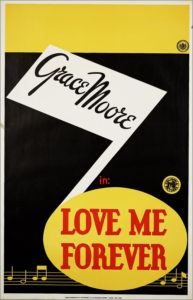Opera Goes to the Movies, 1935-Style
It’s less and less common to see classical music represented in popular culture these days, especially in a positive sense, so imagine my delight when I recently saw that Turner Classic Movies was airing Love Me Forever, a 1935 film starring Metropolitan Opera soprano Grace Moore. I’m rather ashamed to admit I didn’t know Moore’s work prior to seeing the film – I just happened to be browsing TCM’s broadcast schedule, noticed the words “opera singer” in the plot summary, and set my DVR to record.
Moore was born in Mary Willie Grace Moore in Slabtown, Tennessee on December 5, 1898. She briefly studied music in Nashville before moving to Washington, D.C. and then to New York, where she got her first professional singing gig at the Black Cat Cafe in Greenwich Village. She performed in musicals and revues by Jerome Kern and Irving Berlin during the 1920’s, then moved to Paris to study opera. Moore made her Metropolitan Opera debut as Mimi in La Boheme on February 7, 1928. She must have made quite a hit as she went on to reprise the role at Covent Garden and sang sixteen seasons at The Met! Her repertoire featured French and Italian operas, notably the title role in Charpentier’s Louise, her favorite opera and considered by many her finest portrayal.
A number of opera singers were drawn to Hollywood after the advent of talking pictures, and Moore was among them. She made her screen debut in the 1930 film A Lady’s Morals, playing 19th-century soprano Jenny Lind. Later that year, she co-starred with Met colleague Lawrence Tibbett in New Moon, a screen adaptation of The New Moon by Sigmund Romberg. Following a four-year hiatus from pictures, she played a small-town girl who aspires to be an opera singer in One Night of Love – art imitating life? – a role that garnered her an Academy Award nomination for Best Actress. Sadly, she was killed in a 1947 plane crash near Copenhagen’s airport when she was just 48 years old.
Love Me Forever is quintessential Depression-era entertainment in that it features characters who lose their fortunes, romance between people from vastly different backgrounds, class struggle, and visual escapism via absolutely stunning sets and costumes. Designer Robert Kalloch must have had a field day working on this project – the dress Moore wears when she sings Quando me’n vo’ in a nightclub is the epitome of opera costuming a la 1930’s Hollywood.
Moore plays society woman Margaret Howard, well-born but broke due to the Depression. Forced to auction off her personal belongings and family heirlooms, she avoids watching the sale, choosing to play the piano and sing in the room next door instead. Gangster Steve Correlli (wonderfully played by Leo Carrillo) and his right-hand man Luigi (Luis Alberni) are in attendance at the auction, intent on buying up the Howard family’s antiques. An avid music lover, Correlli hears Margaret’s voice and is instantly smitten. He gets her a job as a nightclub singer, then decides she’s meant to be an operatic soprano and opens a fancy nightclub as a showcase for her. Some bigwigs from the Met are persuaded to stop in at the club, they’re bowled over by Margaret’s performance, and suddenly, she’s hired to sing Mimi at the Met! (I’m sure my friends who are actively pursuing full-time opera careers would love a break like that.)
All doesn’t go smoothly, however – Steve has fallen in love with Margaret, but she’s announced her intention to marry Boston socialite Phillip Cameron (Robert Allan.) In despair, Steve continues to champion Margaret’s career, but drinks and gambles in an attempt to soothe his pain. Love Me Forever contains some opera-worthy plot twists and is a tale of love – not only the romantic sort, but of friendship – that’s well worth watching.
Tags:1930's, Academy Award, Covent Garden, gangster, Grace Moore, Hollywood, La Boheme, Lawrence Tibbett, Leo Carrillo, Love Me Forever, Luis Alberni, Mafia, Metropolitan Opera, Mimi, movies, Musetta, new york, nightclub, opera, Puccini, Sigmund Romberg, singer, Soprano









4 Responses to Opera Goes to the Movies, 1935-Style